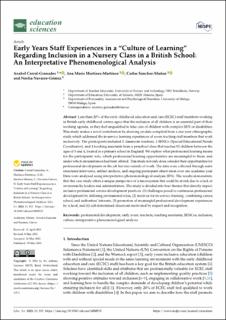| dc.contributor.author | Corral-Granados, Anabel | |
| dc.contributor.author | Martínez-Martínez, Ana María | |
| dc.contributor.author | Sánchez-Muñoz, Carlos | |
| dc.contributor.author | Navarro-Gómez, Noelia | |
| dc.date.accessioned | 2023-11-06T08:14:53Z | |
| dc.date.available | 2023-11-06T08:14:53Z | |
| dc.date.created | 2023-06-12T10:47:19Z | |
| dc.date.issued | 2023 | |
| dc.identifier.citation | Education Sciences. 2023, 13 (5), . | en_US |
| dc.identifier.issn | 2227-7102 | |
| dc.identifier.uri | https://hdl.handle.net/11250/3100658 | |
| dc.description.abstract | Less than 20% of the early childhood education and care (ECEC) staff members working in British early childhood centres agree that the inclusion of all children is an essential part of their working agenda, as they feel unqualified to take care of children with complex SEN or disabilities. This study makes a novel contribution by drawing on data compiled from a one-year ethnographic study which addressed the in-service learning experiences of seven teaching staff members that work inclusively. The participants included 2 classroom teachers, 1 SENCo (Special Educational Needs Coordinator), and 4 teaching assistants from a preschool class that teaches 92 children between the ages of 3 and 4, located in a primary school in England. We explore what professional learning means for the participants’ role, which professional learning opportunities are meaningful to them, and under which circumstances had been offered. This study not only does consider their opportunities for professional development on the job but also outside of work. The data were collected through semi-structured interviews, artifact analysis, and ongoing participant observation over one academic year. Data were analysed using interpretative phenomenological analysis (IPA). The results demonstrate that this case study offers a unique perspective of a microsystem that could be at risk due to a lack of awareness by leaders and administration. The study is divided into four themes that directly impact inclusive professional service-development practices: (1) challenges posed to continuous professional development by differing professional roles, (2) motives for in-service training: combining career, school, and authorities’ interests, (3) promotion of meaningful professional development experiences by school, and (4) self-determined classroom motivated by respect and recognition. | en_US |
| dc.language.iso | eng | en_US |
| dc.publisher | MDPI | en_US |
| dc.rights | Navngivelse 4.0 Internasjonal | * |
| dc.rights.uri | http://creativecommons.org/licenses/by/4.0/deed.no | * |
| dc.title | Early Years Staff Experiences in a “Culture of Learning” Regarding Inclusion in a Nursery Class in a British School: An Interpretative Phenomenological Analysis | en_US |
| dc.title.alternative | Early Years Staff Experiences in a “Culture of Learning” Regarding Inclusion in a Nursery Class in a British School: An Interpretative Phenomenological Analysis | en_US |
| dc.type | Peer reviewed | en_US |
| dc.type | Journal article | en_US |
| dc.description.version | publishedVersion | en_US |
| dc.source.pagenumber | 0 | en_US |
| dc.source.volume | 13 | en_US |
| dc.source.journal | Education Sciences | en_US |
| dc.source.issue | 5 | en_US |
| dc.identifier.doi | 10.3390/educsci13050515 | |
| dc.identifier.cristin | 2153653 | |
| cristin.ispublished | true | |
| cristin.fulltext | original | |
| cristin.qualitycode | 1 | |

